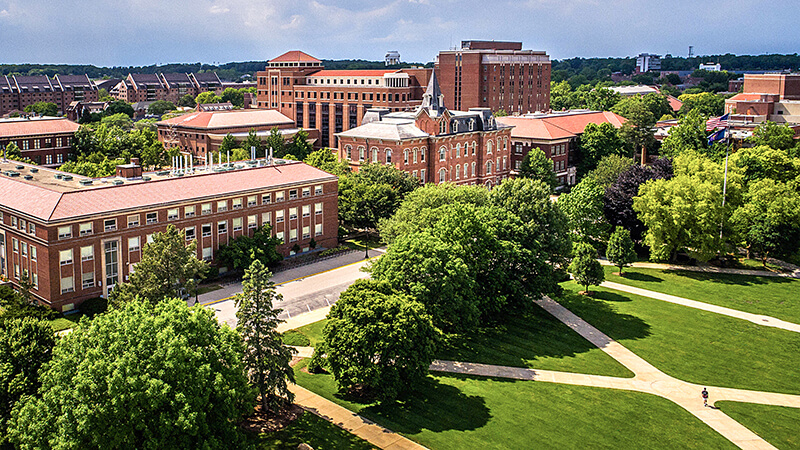June 5, 2020
Purdue receives $10 million from National Science Foundation for Anvil supercomputer

WEST LAFAYETTE, Ind. — Purdue University will soon be the home of Anvil, a powerful new supercomputer that will provide advanced computing capabilities to support a wide range of computational and data-intensive research spanning from traditional high-performance computing to modern artificial intelligence applications.
Anvil, which is funded by a $10 million award from the National Science Foundation, will significantly increase the capacity available to the NSF’s Extreme Science and Engineering Discovery Environment (XSEDE), which serves tens of thousands of researchers across the U.S., and in which Purdue has been a partner for the past nine years. Anvil will enter production in 2021 and will serve researchers for five years. Additional funding from the NSF will support Anvil’s operations and user support.
“Purdue has a long history as a national leader in campus supercomputing, and this award reflects that track record,” said Theresa Mayer, Purdue’s executive vice president for research and partnerships. “High-performance computing is crucial to discovery in all domains today – solving problems in agriculture to sustainably feed the world; in life sciences to understand and cure disease; and in engineering to support our national competitiveness. We are pleased to have the opportunity to build upon our experience providing computing resources and expertise to campus and bring it to bear enabling NSF research across the country.”
Carol Song, the principal investigator and project director for Anvil, and a senior research scientist for ITaP Research Computing, says that Anvil was designed to meet the national science and engineering communities’ needs for capacity, accessibility and effective support in today’s rapidly evolving computational research landscape.
“We are excited to bring a powerful new computing resource to XSEDE researchers and educators, especially those in traditionally under-served domains,” Song said.
By building Anvil alongside its community cluster supercomputers, including the 2020 “Bell” system being built for the Purdue campus, Purdue will leverage its existing campus computing infrastructure, such as massive storage systems, high-speed networking, and its team of expert ITaP staff that has already deployed 14 large supercomputers since 2008. Purdue’s community clusters serve thousands of researchers and students each year.
Preston Smith, executive director of research computing and a co-PI on the project, says that Anvil will be optimized for both the traditional parallel computing that drives research in areas like fluid dynamics and bioinformatics, and also for data science, artificial intelligence and machine learning applications.
“The name ‘Anvil’ reflects the Purdue Boilermakers’ strength and workmanlike focus on producing results, and the Anvil supercomputer will enable important discoveries across many different areas of science and engineering,” Smith said.
“Anvil also will serve as an experiential learning laboratory for students to gain real-world experience using computing for their science, and for student interns to work with the Anvil team for construction and operation. We will be training the research computing practitioners of the future,” he said.
Anvil will be built in partnership with Dell and AMD and will consist of 1,000 nodes with two 64-core AMD Epyc "Milan" processors each, and will deliver over 1 billion CPU core hours to XSEDE each year, with a peak performance of 5.3 petaflops. Anvil’s nodes will be interconnected with 100 Gbps Mellanox HDR InfiniBand. The supercomputer ecosystem also will include 32 large memory nodes, each with 1 TB of RAM, and 16 nodes each with four NVIDIA A100 Tensor Core GPUs providing 1.5 PF of single-precision performance to support machine learning and artificial intelligence applications.
Research on Anvil will be able to leverage a diverse set of storage technologies, anchored by a 10+ PB parallel filesystem, boosted with over 3 PB of flash disk. Storage for active projects and archival data will be provided by Purdue’s Research Data Depot and Fortress archive. Novel workflows will benefit from block and object storage systems also supported by Anvil.
Anvil also will provide a rich set of features that will broaden access to advanced computing, including interactive computing and visualization capabilities, and a fully integrated web-based Open OnDemand gateway to Anvil’s software tools and compute nodes. A composable subsystem will enable cloud and container-based workflows to run alongside the high-performance computing system and will support many modern scientific applications, from gateways, databases, high-throughput data ingestion pipelines, to complex coupled modeling workflows. With seamless pathways to Microsoft Azure cloud, Anvil will help researchers leverage both on-premises and commercial cloud computing for advanced applications such as artificial intelligence modeling and inference.
Amy Friedlander, acting director of the Office of Advanced Cyberinfrastructure at NSF, said, “These awards represent a suite of complementary advanced computational capabilities and services aimed to empower new fundamental research in many fields. NSF’s long-standing investments in advanced and innovative computing respond to the rapid evolution and expansion of computational- and data-intensive research being conducted across all of science and engineering.”
The project is funded under NSF award number 2005632. Xiao Zhu, a computational scientist and senior research scientist for research computing, and Rajesh Kalyanam, a data scientist and software engineer and research scientist for research computing, are co-PIs on the project.
About Purdue University
Purdue University is a top public research institution developing practical solutions to today’s toughest challenges. Ranked the No. 6 Most Innovative University in the United States by U.S. News & World Report, Purdue delivers world-changing research and out-of-this-world discovery. Committed to hands-on and online, real-world learning, Purdue offers a transformative education to all. Committed to affordability and accessibility, Purdue has frozen tuition and most fees at 2012-13 levels, enabling more students than ever to graduate debt-free. See how Purdue never stops in the persistent pursuit of the next giant leap at purdue.edu.
Writer: Adrienne Miller, science and technology writer, Information Technology at Purdue (ITaP), 765-496-8204, mill2027@purdue.edu
Media contact: Steve Tally, 765-494-9809, steve@purdue.edu, @sciencewriter

